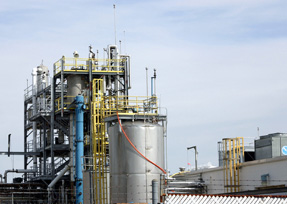What is gasification?
Gasification is a process that converts low-value carbon-containing materials into high-value products, namely gas that can be converted into energy. Common carbonaceous materials used for conversion are coal, biomass, and petroleum coke.
What happens during gasification?
The gasification process has 3 steps:
Carbonaceous materials are heated in the absence of oxygen, and the weight of these materials is decreased by up to 70%. Char and volatile byproducts are produced.
The char and volatile products interact with oxygen to produce carbon dioxide and carbon monoxide. This generates heat that is used for the final step.
The char and the carbon monoxide mix with the heat vapor (produced during combustion) and produce additional carbon monoxide and hydrogen. This resulting gas is called syngas (short for synthesis gas) and can efficiently be converted to energy.
What are the environmental advantages of gasification?
-
It is a clean source of energy that is a viable alternative to electricity, fuels, and chemicals.
-
Syngas produced by the gasification process can be used for a variety of purposes including the production of electricity, steam, liquid fuels, hydrogen, and other basic chemicals.
-
Gasification creates fewer toxic air emissions compared to conventional technologies used for energy production.
-
Gasification can use waste products as feedstock thereby generating useful products from materials that would otherwise be considered trash.
What are the economic advantages of gasification?
-
Gasification can decrease dependence on importing oil and gas from other countries.
-
According to the U.S. Department of Energy, this is the most cost-effective option for capturing carbon dioxide from energy generation.
-
Gasification can substitute expensive natural gas needed for fueling purposes and transportation.
�
What are the disadvantages of gasification?
-
Gasification involves a relatively complicated, multi-step process.
-
The initial feedstock supply needs to be pre-treated to make it ready to undergo gasification.
-
The resulting syngas product must be purified before it can be used as an effective energy source.
...Read more
Close










